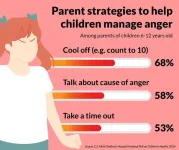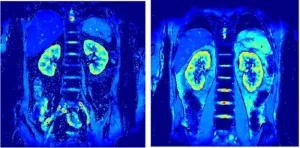(Press-News.org) ANN ARBOR, Mich. – Many parents are all too familiar with angry outbursts from their children, from sibling squabbles to protests over screen time limits.
But some parents may find it challenging to help their kids manage intense emotions. One in seven think their child gets angrier than peers of the same age and four in 10 say their child has experienced negative consequences when angry, a new national poll suggests.
Seven in 10 parents even think they sometimes set a bad example of handling anger themselves, according to the University of Michigan Health C.S. Mott Children’s Hospital National Poll on Children’s Health.
"Children often react intensely to minor frustrations since they’re still building emotional regulation skills. Without guidance on how to express these feelings appropriately, it can lead to disruptive behaviors, problems at school, and strained relationships,” said Mott Poll co-director Sarah Clark, M.P.H.
“Parents play an important role in teaching children how to process and manage their anger productively. But some parents may need guidance themselves on the best strategies to do this.”
The nationally representative report is based on 1,031 responses from parents of children ages 6-12 surveyed in August 2024.
Some children express anger more often
While more than a third of parents feel their child has gotten better at managing anger, two in five worry that their child’s anger will cause problems for them. More parents of boys than girls say that in the past year their child has experienced negative consequences when angry, including hurting themselves or others, having problems with friends, or getting in trouble at school.
Fourteen percent of parents also think their child gets angry more often than same-aged peers – and these parents are more likely to feel that they could be modelling bad anger management, worry that their child’s anger will cause problems, and report their child has experienced negative reactions when angry.
“Children who feel or express emotions strongly may feel different from others, and if they are shamed for their anger, it could make it much worse,” Clark said. “It’s important for parents to let children know that getting angry does not make them a bad person and that they just need to learn to manage it."
But parents may not always use effective strategies through these challenges, with one in three parents saying they haven’t received advice about helping children learn anger management.
And although more than three fifths of parents report their child’s school has teachers or counselors who help children learn to manage their anger, less than half say the school provides information for parents on this topic.
More findings from the report plus strategies to help children process anger more effectively:
Help children identify go-to calming tools
Parents polled endorsed a variety of strategies to help their child deal with anger or frustration.
These strategies include cool-off activities like drawing, counting to ten or deep breathing, thinking about something happy to keep calm, meditation or mindfulness or moving away from other people.
Some children also benefit from a physical outlet for their anger, like ripping paper or squeezing a stress ball – which more parents of boys encouraged than parent of girls. Others may just need an opportunity to vent and be heard.
“For many children, effective strategies involve taking some type of break from the momentary frustration, allowing the opportunity to calm down and regain control,” Clark said. “There’s no magic strategy that works for every child so it’s helpful for parents to seek out different sources of information and advice and try different approaches.”
Recognize what’s behind the anger
Most parents polled recognize their role in helping prevent angry outbursts.
To help their child avoid getting angry or frustrated, parents say they often try to ensure they get enough sleep and exercise, help identify and avoid triggers and avoiding overscheduling.
Children's anger also often stems from feelings of fear or disappointment that they lack the skills to express calmly.
“Anger is often a secondary emotion or a response to underlying feelings,” Clark said. “Understanding this may help adults approach situations with empathy and patience.”
Model calm responses to anger
Most parents polled acknowledged they sometimes set a bad example on managing anger.
By acknowledging their feelings and apologizing, parents can demonstrate effective anger management strategies for their children to use when they get too angry, Clark says.
Adults may consider narrating their self-soothing techniques, such as saying, “I’m feeling frustrated, so I’m going to take a deep breath.”
“Just as it’s natural for children to experience anger, adults do too,” Clark said. “When parents feel they’ve set a bad example, they have a valuable opportunity to turn the situation into a teachable moment.”
Provide positive reinforcement
Clark recommends encouragement when parents notice children handling their anger constructively. Specific praise, such as “that’s great that you took deep breaths instead of yelling,” reinforces use of coping tools.
“Rewarding children for successfully managing a frustrating situation can send a positive message,” she said. “However, punishing a child for getting angry or frustrated will be ineffective unless parents emphasize the importance of using strategies to manage their frustration.
“Some children have temperaments that make them more prone to frustration, leading to quicker and more intense reactions.”
While it’s important to validate feelings, she says, parents should also set clear boundaries on aggressive behavior like hurting others or breaking things.
Take a pulse on children’s anger management at school
Children may face different challenges and frustrations at school than at home, Clark notes.
“At school, children have less control. They’re around peers, don’t have their own space, are forced to follow someone else’s schedule, and they can’t avoid things that make them upset,” Clark said. “It’s important for parents to understand how their children express emotions in this environment outside of home.”
She recommends parents use school conferences to ask how their child handles day-to-day frustrations and inform teachers about strategies that work best at home but could be adapted for the school setting.
Seek professional help if needed
If a child’s anger becomes severe, frequent, or unmanageable, it may be helpful to consult a therapist or counselor.
Children experiencing underlying issues, such as anxiety, trauma, or learning challenges, may have more difficulty managing anger, Clark says. Professional support can provide them with tailored strategies and support families in managing these behaviors effectively.
END
National Poll: Some parents need support managing children's anger
Seven in 10 parents say they sometimes set a bad example for managing anger, 2 in 5 worry their child’s anger will cause problems
2024-11-18
ELSE PRESS RELEASES FROM THIS DATE:
Political shadows cast by the Antarctic curtain
2024-11-18
The scientific debate around the installation of a massive underwater curtain to protect Antarctic ice sheets from melting lacks its vital political perspective. A Kobe University research team argues that the serious questions around authority, sovereignty and security should be addressed proactively by the scientific community to avoid the protected seventh continent becoming the scene or object of international discord.
A January 2024 article in Nature put the spotlight on a bold idea originally proposed by Finnish researchers to save the West Antarctic ...
Scientists lead study on ‘spray on, wash off’ bandages for painful EB condition
2024-11-18
Research into new bandaging aims to ease the agony experienced by those living with genetic skin condition Epidermolysis Bullosa (EB), commonly referred to as 'butterfly skin'.
Scientists at Maynooth University in Ireland are leading research into whether ‘spray on, wash off’ bandages will be a viable alternative to those currently used, which can cause severe pain when applied and removed.
EB, which affects over 500,000 children and adults worldwide including 5,000 in the UK and 300 ...
A new discovery about pain signalling may contribute to better treatment of chronic pain
2024-11-18
When pain signals are passed along the nervous system, proteins called calcium channels play a key role. Researchers at Linköping University, Sweden, have now pinpointed the exact location of a specific calcium channel fine-tuning the strength of pain signals. This knowledge can be used to develop drugs for chronic pain that are more effective and have fewer side effects.
Pain sensations and other information are mainly conducted through our nervous system as electrical signals. Yet at decisive moments, this information is converted to biochemical signals, in the form of specific molecules. To develop future drugs ...
Migrating birds have stowaway passengers: invasive ticks could spread novel diseases around the world
2024-11-18
Ticks travel light, but they carry pathogens with them. When they parasitize migrating birds, these journeys can take them thousands of miles away from their usual geographic range. Historically, they haven’t been able to establish themselves, due to unsuitable climate conditions at the other end of their long journeys. But now, thanks to the climate crisis, it’s getting easier for ticks to survive and spread, potentially bringing novel tick-borne pathogens with them.
“If conditions become more hospitable for tropical tick species to establish themselves in areas where they would previously have been unsuccessful, then there is a chance they could bring new diseases ...
Diabetes drug shows promise in protecting kidneys
2024-11-18
Type 2 diabetes can lead to diabetic kidney disease, but a class of drugs that cause the kidneys to remove glucose through urine has been gaining attention. An Osaka Metropolitan University-led research group has investigated how such drugs maintain kidney health.
Known as SGLT2 (sodium-glucose cotransporter-2) inhibitors, the drugs are used to treat type 2 diabetes along with an exercise and diet regimen. The group led by Graduate School of Medicine Associate Professor Katsuhito Mori focused on the SGLT2 inhibitor canagliflozin and its effects on the kidney.
Using BOLD ...
Updated model reduces liver transplant disparities for women
2024-11-18
SAN DIEGO, California (Nov. 18, 2024) — Since the adoption of a new model for assessing the severity of liver disease, women are more likely to be added to the waitlist for a liver transplant, more likely to receive a transplant, and less likely to drop off the waitlist — closing the gap between men and women candidates, according to a study scheduled for presentation today at The Liver Meeting held by the American Association for the Study of Liver Diseases.
In July 2023, the federal Organ Procurement and Transplant Network (OPTN) updated its Model for End-Stage Liver Disease to a new version, known as MELD 3.0, to better account for differences between ...
Risk of internal bleeding doubles when people on anticoagulants take NSAID painkiller
2024-11-18
People who take an anticoagulant medicine double their risk of an internal bleed if they take a type of painkiller called a non-steroidal anti-inflammatory drug (NSAID) such as ibuprofen, diclofenac or naproxen, according to research published in the European Heart Journal [1] today (Monday).
Anticoagulants are usually prescribed to people who develop a blood clot in the legs or lungs, known as a venous thromboembolism, which affects about one in 12 people. NSAIDs are a popular type of painkiller used to manage issues like headaches, period pain, back pain and arthritis.
The new study is the largest of its kind and shows that ...
‘Teen-friendly’ mindfulness therapy aims to help combat depression among teenagers
2024-11-18
Researchers have developed a mindfulness therapy tailored specifically to appeal to teenagers to help them cope with increasing levels of depression and mental health problems.
The approach teaches participants to tune into and manage negative thought patterns that can trigger or maintain depression, and allow them instead to focus on the present moment.
Developed by teams at the University of Cambridge and King’s College London, the ATTEND programme – Adolescents and carers using mindfulness Therapy To END depression – also includes sessions for parents and guardians, ensuring a family-centred approach ...
Innovative risk score accurately calculates which kidney transplant candidates are also at risk for heart attack or stroke, new study finds
2024-11-17
Using an innovative risk score assessment score, heart researchers at Intermountain Health in Salt Lake City say they can accurately predict whether patients being assessed for kidney transplant will likely have a future major cardiac event, like a heart attack or stroke, according to a new study.
Intermountain Health clinicians regularly review patient data through their electronic health system to determine who may have heart disease without knowing it. Now, in a major new study, Intermountain heart researchers found that using their Intermountain ...
Kidney outcomes in transthyretin amyloid cardiomyopathy
2024-11-17
About The Study: In this retrospective cohort study, decline in kidney function was frequent in patients with transthyretin amyloid cardiomyopathy (ATTR-CM) and was consistently associated with an increased risk of mortality, even after adjusting for established markers of worsening ATTR-CM. eGFR decline represents an independent marker of ATTR-CM disease progression that could guide treatment optimization in clinical practice.
Corresponding Author: To contact the corresponding author, Marianna Fontana, MD, PhD, email m.fontana@ucl.ac.uk.
To access the embargoed study: ...
LAST 30 PRESS RELEASES:
Jeonbuk National University researchers develop an innovative prussian-blue based electrode for effective and efficient cesium removal
Self-organization of cell-sized chiral rotating actin rings driven by a chiral myosin
Report: US history polarizes generations, but has potential to unite
Tiny bubbles, big breakthrough: Cracking cancer’s “fortress”
A biological material that becomes stronger when wet could replace plastics
Glacial feast: Seals caught closer to glaciers had fuller stomachs
Get the picture? High-tech, low-cost lens focuses on global consumer markets
Antimicrobial resistance in foodborne bacteria remains a public health concern in Europe
Safer batteries for storing energy at massive scale
How can you rescue a “kidnapped” robot? A new AI system helps the robot regain its sense of location in dynamic, ever-changing environments
Brainwaves of mothers and children synchronize when playing together – even in an acquired language
A holiday to better recovery
Cal Poly’s fifth Climate Solutions Now conference to take place Feb. 23-27
Mask-wearing during COVID-19 linked to reduced air pollution–triggered heart attack risk in Japan
Achieving cross-coupling reactions of fatty amide reduction radicals via iridium-photorelay catalysis and other strategies
Shorter may be sweeter: Study finds 15-second health ads can curb junk food cravings
Family relationships identified in Stone Age graves on Gotland
Effectiveness of exercise to ease osteoarthritis symptoms likely minimal and transient
Cost of copper must rise double to meet basic copper needs
A gel for wounds that won’t heal
Iron, carbon, and the art of toxic cleanup
Organic soil amendments work together to help sandy soils hold water longer, study finds
Hidden carbon in mangrove soils may play a larger role in climate regulation than previously thought
Weight-loss wonder pills prompt scrutiny of key ingredient
Nonprofit leader Diane Dodge to receive 2026 Penn Nursing Renfield Foundation Award for Global Women’s Health
Maternal smoking during pregnancy may be linked to higher blood pressure in children, NIH study finds
New Lund model aims to shorten the path to life-saving cell and gene therapies
Researchers create ultra-stretchable, liquid-repellent materials via laser ablation
Combining AI with OCT shows potential for detecting lipid-rich plaques in coronary arteries
SeaCast revolutionizes Mediterranean Sea forecasting with AI-powered speed and accuracy
[Press-News.org] National Poll: Some parents need support managing children's angerSeven in 10 parents say they sometimes set a bad example for managing anger, 2 in 5 worry their child’s anger will cause problems





